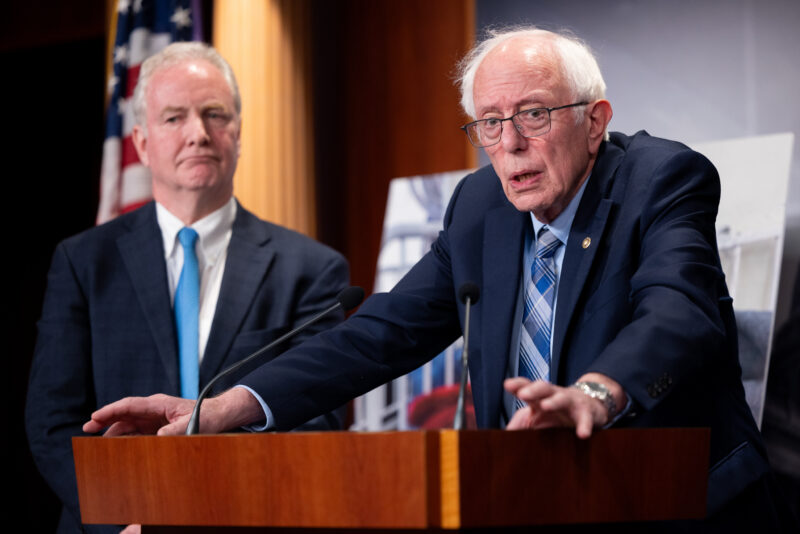Netanyahu to meet with VP Kamala Harris at pivotal time in war and politics
As Israel makes military gains, Harris will be pressed to clarify her own views on the U.S.-Israel relationship

Amos Ben-Gershom (GPO)
Israeli Prime Minister Benjamin Netanyahu at Ben Gurion Airport ahead of his flight to Washington, July 22nd, 2024
Israeli Prime Minister Benjamin Netanyahu’s planned meeting with Vice President Kamala Harris this week has grown in importance since Harris emerged earlier this week as the likely Democratic presidential nominee, while a scheduled meeting with outgoing President Joe Biden remains pivotal to Israel’s war effort.
“This is a crucial moment for Israeli and American leaders,” Jonathan Schanzer, senior vice president at the Foundation for Defense of Democracies, told Jewish Insider. “It’s a much more interesting moment than people realize.”
“The heavy fighting in Gaza may be starting to wind down … Israelis are increasingly convinced they killed [Hamas military commander] Mohammed Deif and have taken out a number of other senior Hamas leaders, and now [Israel] controls the supply lines on the Philadelphi Corridor — a huge accomplishment,” Schanzer noted.
However, the incessant political drama in the U.S. has kept Israel off the front pages such that Washington has “not yet fully acknowledged” this situation, he said.
Former Israeli Ambassador to the U.S. Michael Oren argued that the Netanyahu-Harris meeting is a more politically consequential meeting than any conversation Netanyahu could have with Biden. Harris, as the likely presidential nominee, will have her first chance to showcase her commander-in-chief credentials in her meeting with Netanyahu, while also clarifying her own campaign’s views towards Israel.
Harris will not, however, preside over Netanyahu’s speech to Congress on Wednesday, due to previously planned travel. A Harris aide told JI it “should not be interpreted as a change in her position with regard to Israel.”
“Throughout her career, the VP has had an unwavering commitment to the security of Israel. That remains true today,” said the aide. In the meeting, Harris will discuss ongoing cease-fire negotiations and “convey her view that it is time for the war to end in a way where Israel is secure, all hostages are released, the suffering of Palestinian civilians in Gaza ends, and the Palestinian people can enjoy their right to dignity, freedom, and self-determination,” according to the aide.
The aide to Harris, in comments to JI, touted Harris’ support for Israel since Oct. 7. “Since Oct. 7, she has been deeply engaged with Israeli officials as part of our administration’s support for Israel as it works to eliminate the threat of Hamas,” the aide said, highlighting Harris’ meetings in recent months with Israeli President Isaac Herzog and former war cabinet member Benny Gantz. “She has repeatedly condemned Hamas’ brutal attack on Oct. 7 and expressed support for Israel’s right to defend itself.”
In her meeting with Netanyahu, she will offer condemnation of Hamas’ attack and “horrific sexual violence,” and “underscore her commitment to ensure Israel can defend itself from threats from Iran and Iranian-backed militias, including Lebanese Hezbollah and Hamas,” the aide said. Harris will also “reiterate her deep concerns about the humanitarian situation in Gaza and the loss of innocent life.”
Oren said that Harris’ meeting with Netanyahu will be “her first meeting with an international statesman” since she announced she would be running for the Democratic nomination. “She will be seen as presidential. Netanyahu — whether you like him or not — is one of the few international figures who is recognized in the U.S. How many Americans know who the prime minister of England or the president of France is? But they know Netanyahu.”
The meeting would be a chance for Harris to “refashion herself as a Democratic centrist and not a progressive,” Oren added.
Schanzer similarly said that Harris “doesn’t have a lot of foreign policy experience, and the chance to sit with a well-known world leader at a moment of crisis in the Middle East to demonstrate her foreign policy chops is not a bad opportunity at all.”
Harris may be “tempted to try to speak to the progressive wing of the [Democratic] Party” and take a more critical approach to Israel in the meeting, Schanzer warned.
Michael Koplow, chief policy officer for the Israeli Policy Forum, said a meeting with Netanyahu will be a chance for Harris to reassure “pockets of people in the American Jewish community who are warier of her than they were of Biden. People are looking for some kind of signal that she’s not coming in and treating [Netanyahu] as a hostile actor.”
Netanyahu will also have a chance to build a relationship with Harris, who is the only senior administration official who has not visited Israel since the Oct. 7 Hamas terror attacks.
Koplow said that it is “really important for [Netanyahu] to try to establish some common ground and some solid footing, particularly because he doesn’t want to leave her with the impression that he’s in the bag for [Republican nominee Donald] Trump or meddling in the election.”
“I think for both of them” — Netanyahu and Harris — “there are stakes involved,” Koplow added.
There is also a lot at stake for Netanyahu’s now-postponed meeting with the outgoing Biden. That meeting was scheduled for Monday, then pushed off to Tuesday, and now likely to happen on Thursday, as the president reportedly continues to exhibit symptoms of COVID-19.
Biden said on Monday that he will dedicate the coming months to bringing the hostages home from Gaza and ending the war, saying that “we are on the verge of getting that.” The president plans to meet with the families of hostages this week, according to AP.
Koplow pointed out that “all of these things don’t just go away because Biden isn’t running for reelection,” Koplow said. “I don’t think Biden being a lame duck for six months will impact the war very much … Israel still needs the Biden administration’s help on all sorts of things.”
The Biden-Netanyahu meeting is “critical,” Koplow said, because Israel “needs to make sure Biden is on board with sending weapons to Israel, especially given the possibility of an escalation in the north, and needs to make sure Biden is on the same page” with regards to responding to attacks by Iranian proxies like the Houthis and to the possibility that the International Criminal Court will issue arrest warrants for Netanyahu and Israeli Defense Minister Yoav Gallant.
Schanzer argued that it is crucial that Netanyahu and Biden work together at a time when Hamas leaders are voicing concerns about their ability to continue the war and there is potential for the fighting between Israel and Hezbollah or Israel and the Houthis to further escalate.
”What we’re watching right now is a very delicate moment in the Middle East, one where you’d hope the leaders would come together for intense consultations,” he added.
Schanzer said that Biden remains important to Israelis, who “don’t do medium- and long-term thinking. They do short-term crisis management.”
Oren said he saw “only pros” to Netanyahu landing in Washington at this politically turbulent time.
“It’s a chance for Biden to show that he’s still president,” Oren said.
Schanzer said that ”Biden is going to relish this moment. The way it’s being described, this is a man who allowed his staff to manage him, and he disagrees with that characterization vehemently. This is his opportunity to show the American people that even though he’s stepping down, he’s still very much the commander-in-chief … still very much engaged in matters of foreign policy crucial to the American people.”
Netanyahu is “a foreign leader who Biden knows well and whose policies he’s helped shape over the past nine months. He has invested his reputation and time in Israel,” he added.
When Netanyahu addresses a joint session of Congress on Wednesday, the political news in Washington will likely mute the impact the prime minister hoped it would have: shaping the narrative about the war, reminding observers of the Hamas terror attack of Oct. 7 and calling attention to the plight of the hostages and the shared goals of the U.S. and Israel in countering Iran-sponsored terrorism.
Koplow said that “there are pros and cons if you’re Netanyahu. On the one hand, there was a lot of gearing up for protests … and while I’m sure there will still be some, I think that a lot of the air is going to be out of the balloon given how focused everyone is now on the presidential race,” he said.
At the same time, he said, Netanyahu “obviously in coming and giving a speech to Congress wants to have attention on Israel, and Oct. 7 and the various challenges Israel faces … Many of us expected it to dominate news coverage. There will be some, but it’s not going to be felt nearly as much as it would have.”
Then there’s the argument that a distracted Washington is good for Israel — the taking of the Philadelphi Corridor and strike on Deif in recent weeks happened while Biden was trying to save his reelection campaign and a gunman attempted to assassinate former President Donald Trump.
Such a situation gives Israel “more room to maneuver,” Schanzer said, but he added:
”I believe the changes that have occurred on the battlefield in Gaza were going to happen anyway.”
”It took quite a while,” Schanzer said, “but it appears [Israel] has finally ground out the war in Gaza to the point where they are potentially on the cusp of victory. It’s a good time to come to Washington, in a position of strength.”
Oren argued that the Biden administration was not distracted from Israel, but that there is “a real difference in their approach.”
”I do think the administration in recent weeks has finally internalized that by holding Israel back all the time, they allowed [Hamas leader Yahya] Sinwar to believe that time is on his side,” he said. “Now, there is next to no criticism of the conduct of the war by Israel. I think they realize the only way to move Hamas to a deal is ramping up military pressure.”
Koplow said that now is not a time in which Israel wants Washington to be looking elsewhere.
“Netanyahu is signaling in all sorts of ways that he is preparing for an agreement in the next couple of weeks,” he said. Those signals include the announcement that Israel’s negotiating team will be traveling to Qatar on Thursday to continue talks, and a statement by Shas, a member of Netanyahu’s ruling coalition, that it is a religious imperative to pursue a hostage deal — a statement that Koplow speculated got a green light from Netanyahu.
If there is a hostage deal, Koplow said, “it will be in Israel’s benefit to be in the news. It will quiet some of the critics and regain some international credibility for Israel.”













































